Welcome to the University of Iowa Libraries’ virtual New Book Shelf. Here we will present new titles for you to browse and check out. Titles listed here will be monographs published in the current year. If you see a title you would like to borrow, please click the link below the item and sign in with your Hawk ID and Password to request a loan.
What the Amish Teach Us: Plain Living in a Busy World

What do the traditional plain-living Amish have to teach twenty-first-century Americans in our hyper-everything world? As it turns out, quite a lot!
It sounds audacious, but it’s true: the Amish have much to teach us. It may seem surreal to turn to one of America’s most traditional groups for lessons about living in a hyper-tech world―especially a horse-driving people who resist “progress” by snubbing cars, public grid power, and high school education. Still, their wisdom confirms that even when they seem so far behind, they’re out ahead of the rest of us.
Having spent four decades researching Amish communities, Donald B. Kraybill is in a unique position to share important lessons from these fascinating Plain people. In this inspiring book, we learn intriguing truths about community, family, education, faith, forgiveness, aging, and death from real Amish men and women. The Amish are ahead of us, for example, in relying on apprenticeship education. They have also out-Ubered Uber for nearly a century, hiring cars owned and operated by their neighbors. Kraybill also explains how the Amish function in modern society by rejecting new developments that harm their community, accepting those that enhance it, and adapting others to fit their values.
Pairing storytelling with informative and reflective passages, these twenty-two essays offer a critique of modern culture that is provocative yet practical. In a time when civil discourse is raw and coarse and our social fabric seems torn asunder, What the Amish Teach Us uproots our assumptions about progress and prods us to question why we do what we do.
https://search.lib.uiowa.edu/permalink/f/9i2ftm/01IOWA_ALMA21847637850002771
The Black Agenda: Bold Solutions for a Broken System
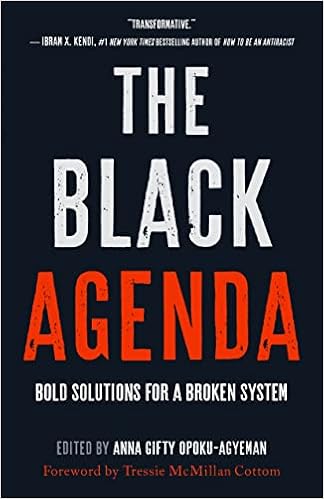
“The Black Agenda mobilizes top Black experts from across the country to share transformative perspectives on how to deploy anti-racist ideas and policies into everything from climate policy to criminal justice to healthcare. This book will challenge what you think is possible by igniting long overdue conversations around how to enact lasting and meaningful change rooted in racial justice.” ―Ibram X. Kendi, #1 New York Times bestselling author of How to Be an Antiracist and Stamped From the Beginning
From ongoing reports of police brutality to the disproportionate impact COVID-19 has had on Black Americans, 2020 brought a renewed awareness to the deep-rootedness of racism and white supremacy in every facet of American life.
Edited by Anna Gifty Opoku-Agyeman, The Black Agenda is the first book of its kind―a bold and urgent move towards social justice through a profound collection of essays featuring Black scholars and experts across economics, education, health, climate, and technology. It speaks to the question “What’s next for America?” on the subjects of policy-making, mental health, artificial intelligence, climate movement, the future of work, the LGBTQ community, the criminal legal system, and much more.
Essayists including Dr. Sandy Darity, Dr. Hedwig Lee, Mary Heglar, and Janelle Jones present groundbreaking ideas ranging from Black maternal and infant health to reparations to AI bias to inclusive economic policy, with the potential to uplift and heal not only Black America, but the entire country.
https://search.lib.uiowa.edu/permalink/f/9i2ftm/01IOWA_ALMA21846513960002771
How We Can Win: Race, History and Changing the Money Game That’s Rigged

A breakdown of the economic and social injustices facing Black people and other marginalized citizens inspired by political activist Kimberly Jones’ viral video, “How Can We Win.”
“So if I played four hundred rounds of Monopoly with you and I had to play and give you every dime that I made, and then for fifty years, every time that I played, if you didn’t like what I did, you got to burn it like they did in Tulsa and like they did in Rosewood, how can you win? How can you win?”
When Kimberly Jones declared these words amid the protests spurred by the murder of George Floyd, she gave a history lesson that in just over six minutes captured the economic struggles of Black people in America. Within days the video had been viewed by millions of people around the world, riveted by Jones’s damning―and stunningly succinct―analysis of the enduring disparities Black Americans face.
In How We Can Win, Jones delves into the impacts of systemic racism and reveals how her formative years in Chicago gave birth to a lifelong devotion to justice. Here, in a vital expansion of her declaration, she calls for Reconstruction 2.0, a multilayered plan to reclaim economic and social restitutions―those restitutions promised with emancipation but blocked, again and again, for more than 150 years. And, most of all, Jones delivers strategies for how we can effect change as citizens and allies while nurturing ourselves―the most valuable asset we have―in the fight against a system that is still rigged.
https://search.lib.uiowa.edu/permalink/f/9i2ftm/01IOWA_ALMA21844822320002771
Blacks and Jews in America: An Invitation to Dialogue
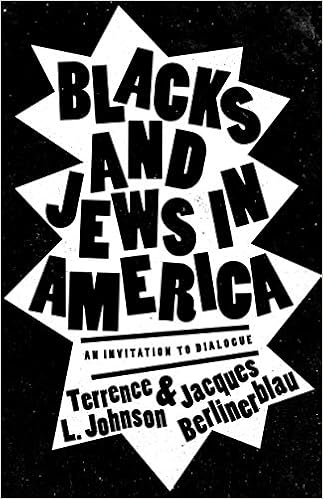
A Black-Jewish dialogue lifts a veil on these groups’ unspoken history, shedding light on the challenges and promises facing American democracy from its inception to the present
In this uniquely structured conversational work, two scholars ― one of African American politics and religion, and one of contemporary American Jewish culture ― explore a mystery: Why aren’t Blacks and Jews presently united in their efforts to combat white supremacy? As alt-right rhetoric becomes increasingly normalized in public life, the time seems right for these one-time allies to rekindle the fires of the civil rights movement.
Blacks and Jews in America investigates why these two groups do not presently see each other as sharing a common enemy, let alone a political alliance. Authors Terrence L. Johnson and Jacques Berlinerblau consider a number of angles, including the disintegration of the “Grand Alliance” between Blacks and Jews during the civil rights era, the perspective of Black and Jewish millennials, the debate over Louis Farrakhan and the Nation of Islam, and the Israel-Palestine conflict.
Ultimately, this book shows how the deep roots of the Black-Jewish relationship began long before the mid-twentieth century, changing a narrative dominated by the Grand Alliance and its subsequent fracturing. By engaging this history from our country’s origins to its present moment, this dialogue models the honest and searching conversation needed for Blacks and Jews to forge a new understanding.
https://search.lib.uiowa.edu/permalink/f/9i2ftm/01IOWA_ALMA21842988100002771
You Sound Like a White Girl: The Case for Rejecting Assimilation
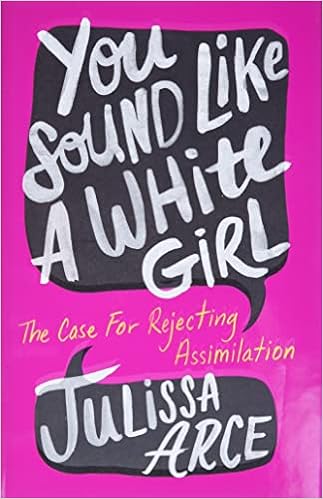
“Unflinching” ―Ms. Magazine • “Phenomenal” ―BookRiot • “An essential read” ―Kirkus, starred review • “Necessary” ―Library Journal • “Powerful” ―Joaquin Castro • “Illuminating” ―Reyna Grande • “A love letter to our people” ―José Olivarez • “I have been waiting for this book all my life” ―Paul Ortiz
Bestselling author Julissa Arce calls for a celebration of our uniqueness, our origins, our heritage, and the beauty of the differences that make us Americans in this powerful polemic against the myth that assimilation leads to happiness and belonging for immigrants.
“You sound like a white girl.” These were the words spoken to Julissa by a high school crush as she struggled to find her place in America. As a brown immigrant from Mexico, assimilation had been demanded of her since the moment she set foot in San Antonio, Texas, in 1994. She’d spent so much time getting rid of her accent so no one could tell English was her second language that in that moment she felt those words―you sound like a white girl?―were a compliment. As a child, she didn’t yet understand that assimilating to “American” culture really meant imitating “white” America―that sounding like a white girl was a racist idea meant to tame her, change her, and make her small. She ran the race, completing each stage, but never quite fit in, until she stopped running altogether.
In this dual polemic and manifesto, Julissa dives into and tears apart the lie that assimilation leads to belonging. She combs through history and her own story to break down this myth, arguing that assimilation is a moving finish line designed to keep Black and brown Americans and immigrants chasing racist American ideals. She talks about the Lie of Success, the Lie of Legality, the Lie of Whiteness, and the Lie of English―each promising that if you obtain these things, you will reach acceptance and won’t be an outsider anymore. Julissa deftly argues that these demands leave her and those like her in a purgatory―neither able to secure the power and belonging within whiteness nor find it in the community and cultures whiteness demands immigrants and people of color leave behind.
In You Sound Like a White Girl, Julissa offers a bold new promise: Belonging only comes through celebrating yourself, your history, your culture, and everything that makes you uniquely you. Only in turning away from the white gaze can we truly make America beautiful. An America where difference is celebrated, heritage is shared and embraced, and belonging is for everyone. Through unearthing veiled history and reclaiming her own identity, Julissa shows us how to do this.
https://search.lib.uiowa.edu/permalink/f/9i2ftm/01IOWA_ALMA21846514980002771
Once Upon a Time We Ate Animals: The Future of Food

Combining the ethical clarity of Jonathan Safran Foer’s Eating Animals with the disquieting vision of Alan Weissman’s bestseller The World Without Us, a thought-provoking, entertaining exploration of a future where animal consumption is a thing of the past.
Though increasing numbers of people know that eating meat is detrimental to our planet’s health, many still can’t be convinced to give up eating meat. But how can we change behavior when common arguments and information aren’t working?
Acclaimed anthropologist Roanne Van Voorst changes the dialogue. In Once Upon a Time We Ate Animals, she shifts the focus from the present looking forward to the future looking back—imagining a world in which most no longer use animals for food, clothing, or other items. By shifting the viewpoint, she offers a clear and compelling vision of what it means to live in a world without meat.
A massive shift is already taking place—everything van Voorst covers in this book has already been invented and is being used today by individuals and small organizations worldwide.
Hopeful and persuasive, Once Upon a Time We Ate Animals offers a tantalizing vision of what is not only possible but perhaps inevitable.
https://search.lib.uiowa.edu/permalink/f/9i2ftm/01IOWA_ALMA21844813110002771
Impact: How Rocks from Space Led to Life, Culture, and Donkey Kong
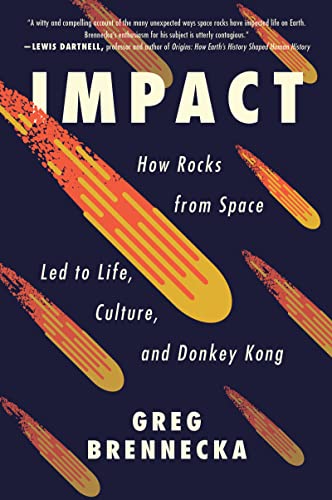
A Short History of Nearly Everything meets Astrophysics for People in a Hurry in this humorous, accessible exploration of how meteorites have helped not only build our planet but steered the evolution of life and human culture.
The Solar System. Dinosaurs. Donkey Kong. What is the missing link? Surprisingly enough, it’s meteorites. They explain our past, constructed our present, and could define our future.
Impact argues that Earth would be a lifeless, inhospitable piece of rock without being fortuitously assaulted with meteorites throughout the history of the planet. These bombardments transformed Earth’s early atmosphere and delivered the complex organic molecules that allowed life to develop on our planet. While meteorites have provided the raw materials for life to thrive, they have radically devastated life as well, most famously killing off the dinosaurs and paving the way for humans to evolve to where we are today.
As noted meteoriticist Greg Brennecka explains, meteorites did not just set us on the path to becoming human, they helped direct the development of human culture. Meteorites have influenced humanity since the start of civilization. Over the centuries, meteorite falls and other cosmic cinema have started (and stopped) wars, terrified millions, and inspired religions throughout the world.
With humor and an infectious enthusiasm, Brennecka reveals previously untold but important stories sure to delight and inform readers about the most important rocks on Earth.
https://search.lib.uiowa.edu/permalink/f/9i2ftm/01IOWA_ALMA21846514740002771
Churchill & Son

The intimate, untold story of Winston Churchill’s enduring yet volatile bond with his only son, Randolph
“Ireland draws unforgettable sketches of life in the Churchill circle, much like Erik Larson did in The Splendid and the Vile.”―Kirkus •“Fascinating… well-researched and well-written.”—Andrew Roberts • “Beautifully written… A triumph.”—Damien Lewis • “Fascinating, acute and touching.”—Simon Sebag Montefiore
We think we know Winston Churchill: the bulldog grimace, the ever-present cigar, the wit and wisdom that led Great Britain through the Second World War. Yet away from the House of Commons and the Cabinet War Rooms, Churchill was a loving family man who doted on his children, none more so than Randolph, his only boy and Winston’s anointed heir to the Churchill legacy.
Randolph may have been born in his father’s shadow, but his father, who had been neglected by his own parents, was determined to see him go far. For decades, throughout Winston’s climb to greatness, father and son were inseparable—dining with Britain’s elite, gossiping and swilling Champagne at high society parties, holidaying on the French Riviera, touring Prohibition-era America. Captivated by Winston’s power, bravery, and charisma, Randolph worshipped his father, and Winston obsessed over his son’s future. But their love was complex and combustible, complicated by money, class, and privilege, shaded with ambition, outsize expectations, resentments, and failures.
Deeply researched and magnificently written, Churchill & Son is a revealing and surprising portrait of one of history’s most celebrated figures.
https://search.lib.uiowa.edu/permalink/f/9i2ftm/01IOWA_ALMA21844821780002771
To Rescue the Republic: Ulysses S. Grant, the Fragile Union, and the Crisis of 1876
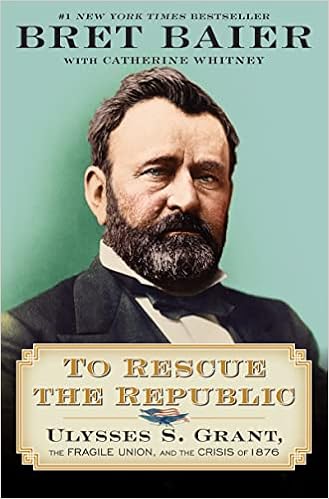
Fox News Channel’s Chief Political Anchor illuminates the heroic life of Ulysses S. Grant
“To Rescue the Republic is narrative history at its absolute finest. A fast-paced, thrilling and enormously important book.” —Douglas Brinkley
An epic history spanning the battlegrounds of the Civil War and the violent turmoil of Reconstruction to the forgotten electoral crisis that nearly fractured a reunited nation, Bret Baier’s To Rescue the Republic dramatically reveals Ulysses S. Grant’s essential yet underappreciated role in preserving the United States during an unprecedented period of division.
Born a tanner’s son in rugged Ohio in 1822 and battle-tested by the Mexican American War, Grant met his destiny on the bloody fields of the Civil War. His daring and resolve as a general gained the attention of President Lincoln, then desperate for bold leadership. Lincoln appointed Grant as Lieutenant General of the Union Army in March 1864. Within a year, Grant’s forces had seized Richmond and forced Robert E. Lee to surrender.
Four years later, the reunified nation faced another leadership void after Lincoln’s assassination and an unworthy successor completed his term. Again, Grant answered the call. At stake once more was the future of the Union, for though the Southern states had been defeated, it remained to be seen if the former Confederacy could be reintegrated into the country—and if the Union could ensure the rights and welfare of African Americans in the South. Grant met the challenge by boldly advancing an agenda of Reconstruction and aggressively countering the Ku Klux Klan.
In his final weeks in the White House, however, Grant faced a crisis that threatened to undo his life’s work. The contested presidential election of 1876 produced no clear victory for either Republican Rutherford B. Hayes or Democrat Samuel Tilden, who carried most of the former Confederacy. Soon Southern states vowed to revolt if Tilden was not declared the victor. Grant was determined to use his influence to preserve the Union, establishing an electoral commission to peaceably settle the issue. Grant brokered a grand bargain: the installation of Republican Hayes to the presidency, with concessions to the Democrats that effectively ended Reconstruction. This painful compromise saved the nation, but tragically condemned the South to another century of civil-rights oppression.
Deep with contemporary resonance and brimming with fresh detail that takes readers from the battlefields of the Civil War to the corridors of power where men decided the fate of the nation in back rooms, To Rescue the Republic reveals Grant, for all his complexity, to be among the first rank of American heroes.
https://search.lib.uiowa.edu/permalink/f/9i2ftm/01IOWA_ALMA21844812480002771
White Lies: The Double Life of Walter F. White and America’s Darkest Secret

An “electrifying” biography of Walter White, a little-remembered Black civil rights leader who passed for white in order to investigate racist murders, help put the NAACP on the map, and change the racial identity of America forever (Chicago Review of Books).
Walter F. White led two lives: one as a leader of the Harlem Renaissance and the NAACP in the early twentieth century; the other as a white newspaperman who covered lynching crimes in the Deep South at the blazing height of racial violence. Born mixed race and with very fair skin and straight hair, White was able to “pass” for white. He leveraged this ambiguity as a reporter, bringing to light the darkest crimes in America and helping to plant the seeds of the civil rights movement.
White’s risky career led him to lead a double life. He was simultaneously a second-class citizen subject to Jim Crow laws at home and a widely respected professional with full access to the white world at work. His life was fraught with internal and external conflict—much like the story of race in America. Starting out as an obscure activist, White ultimately became Black America’s most prominent leader, during his time. A character study of White’s life and career with all these complexities has never been rendered, until now.
By the award-winning, New York Times bestselling author of The Accidental President, Dewey Defeats Truman, and The Arsenal of Democracy, White Lies uncovers the life of a civil rights leader unlike any other.
https://search.lib.uiowa.edu/permalink/f/9i2ftm/01IOWA_ALMA21844813230002771